LARRY’S LIST invited Nalada Taechanarong, founder of Xumiiro Gallery and long-time champion of video art, to converse with digital art collector, Leroy Bennett, and find out all about his obsession with digital and video art.
Nalada has established herself as a leader in the world of digital art through Xumiiro. Her gallery takes an innovative model in recognition of this new chapter in art history: Xumiiro only represents one digital video artist – 0010×0010 – and the artist is only represented by Xumiiro. Through her passion for video art, she connected with Leroy Bennett over the format and the possibilities that digital art brings to the art world.
More than a collector, Leroy is an artist himself. His medium? Light and sound in production design. He is the creative visionary behind a number of world-class productions including Lady Gaga’s 2019 Las Vegas Residency and her upcoming 2022 stadium tour, Ariana Grande’s 2019 Coachella performance, Beyonce’s 2013 Mrs. Carter Show World Tour and Super Bowl performance, and multiple tours by Prince in the 1990s.
Here, LARRY’S LIST presents their chat about Leroy’s motivations for collecting, how he displays his digital art, his inspirations in the art world, and three emerging digital artists we need to know.
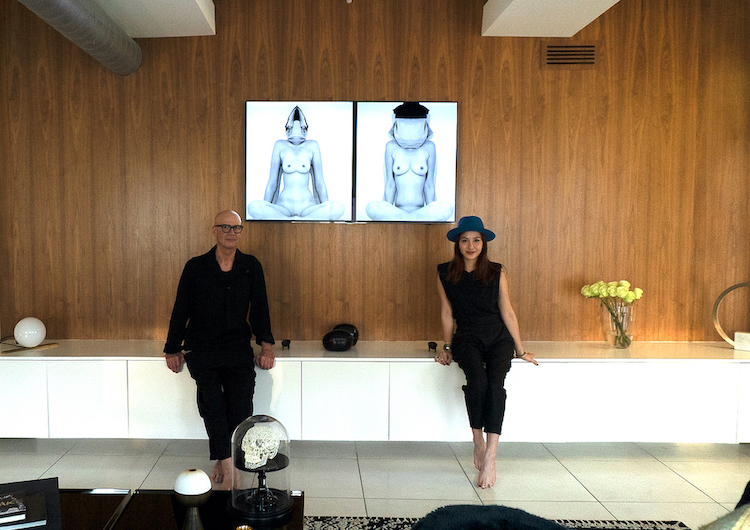
Collecting
What made you want to start collecting art? What is the main motivation behind your collecting?
I grew up in a household that was very art-driven; I was surrounded by art my entire life. My father, being an interior designer, had a great appreciation for art, so I was exposed to a lot of it; and over the years, I developed a sense for the things that I like. I collect art for the pieces that I like. I don’t collect them necessarily as an investment.
My main reason for collecting art is that I appreciate art that inspires me. And I like to have things in my house that, when I’m at home (little as I am at home), it adds to the environment of the home, and it adds to the inspiration of maybe triggering off things in my own designs.
What is your focus regarding the artists in your collection?
Well, oddly enough, most of the pieces in my collection are of women — strong women. I don’t know if that was intentional or just the pieces of art that I was drawn to.
Some of it is digital art. Some of it the artist produced art in a digital way. One of my pieces is by Kazuki Takamatsu, and it is in mixed media of digital and oil and other things. Other pieces reflect my fascination with the growing world of animated or digital art based on coding. All that stuff is really fascinating, and it’s art that I want to use within my productions.
Are you more interested in emerging or renowned artists, local or international?
I’m always interested in emerging artists. I mean, I have an appreciation for renowned artists, but I’m always attracted to the new. I like things that are different. It’s the way I live my life in regards to fashion or music or anything. I don’t like mainstream. So, a lot of reason why I’m focused on emerging artists is pretty much for that fact. And whether local or international, I’m fascinated by all artists, so it doesn’t matter where they’re from.
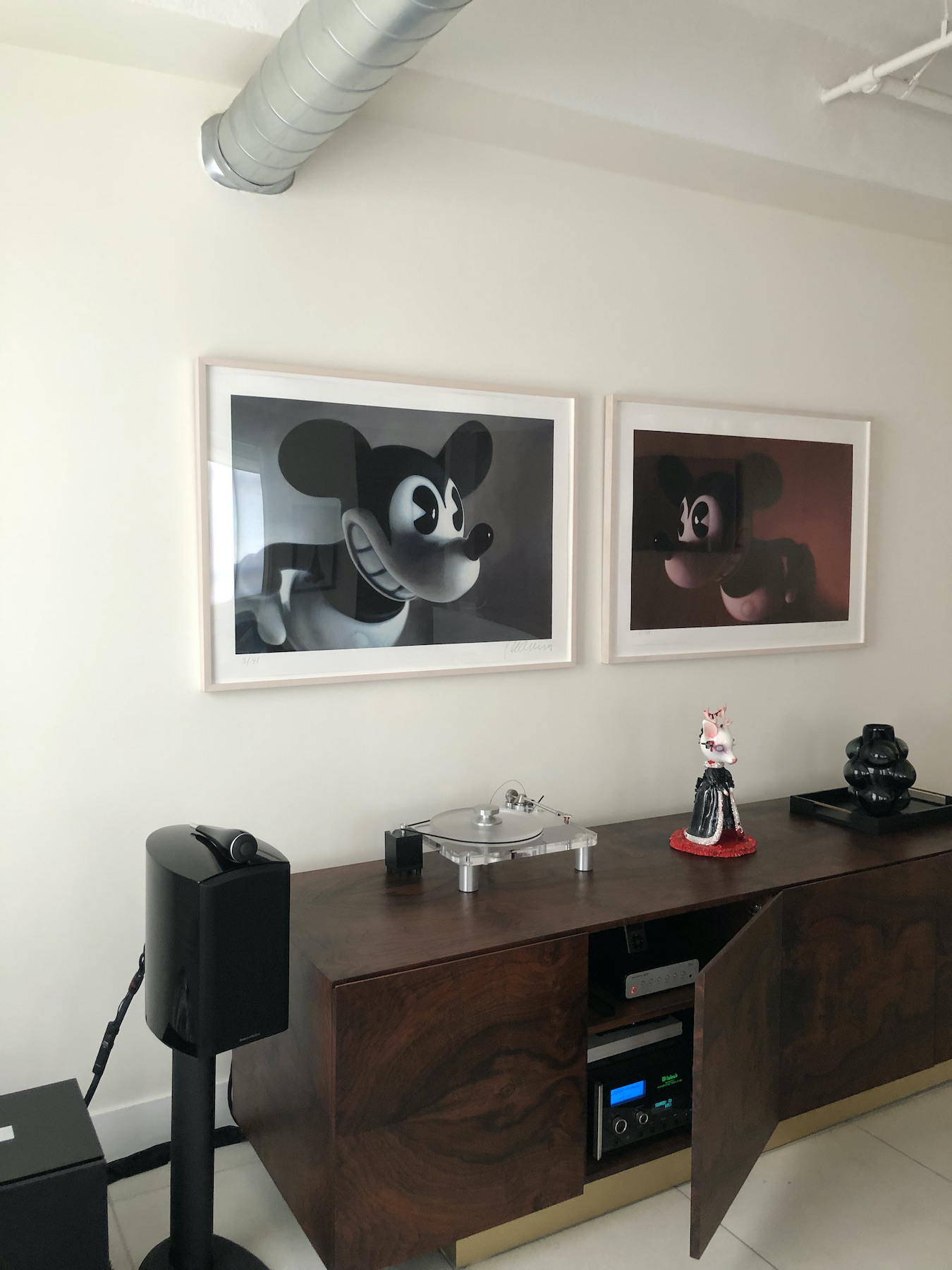
What was the first artwork you purchased? What was the latest?
Well, the first piece of art that I purchased was quite a long time ago in the 1980s. It was an Erté sculpture. But then, my taste, my focus and my appreciation for art has changed over the years as art has changed and evolved. My most recent purchase is an artwork by digital artist 0010×0010.
How many artworks do you own?
I have quite a few pieces. I actually have some that are in storage at the moment that I need to get framed. I would say I have at least two dozen pieces of art in my home.
As a digital art collector, how and where do you display your collection?
Well, at home I have two ways of displaying it: through either a television set on a living room wall or projecting it onto one of the walls in my house.
What I like about digital art is that it’s a medium you can travel with. It can be an actual physical piece, but also, at the same time, it can be something that you can carry with you. And I travel a lot. So what I like about it is that I can bring my art with me wherever I travel in the world. Either I play it by a projector, or through the TV sets in the hotels that, basically, I live in. The artwork, particularly by 0010×0010, has an audio track to it, too, so it’s more of an environmental experience versus just looking at a picture.
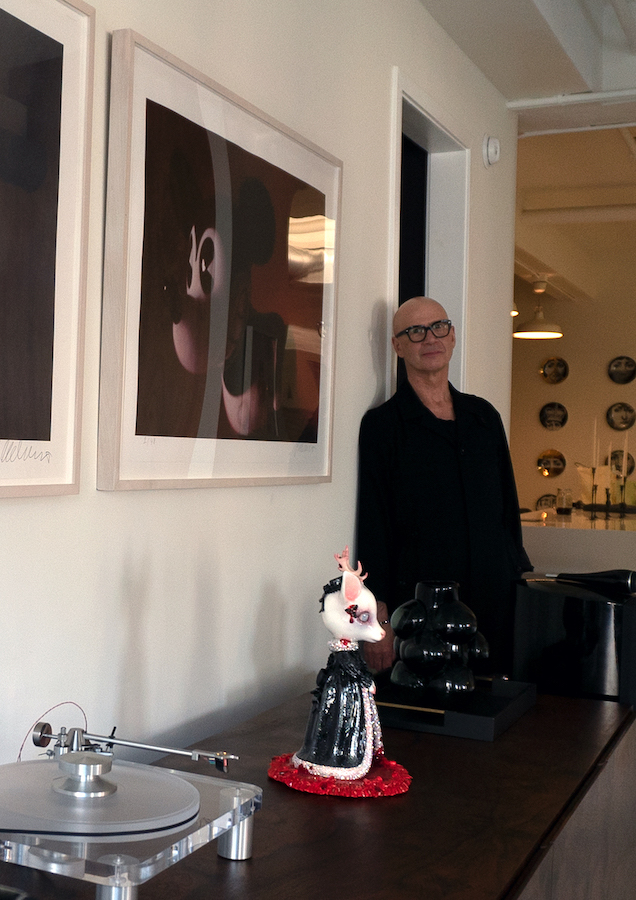
Have you ever presented your art collection publicly?
The closest the public would ever come to seeing my artwork is through people coming into my house. I live in a building where they do a “Loft Walk” once a year where people come and look at all the different lofts. That’s the closest I come to having public come to see my art.
Is there any kind of artwork that can make you write a cheque without any consideration?
Ultimately, if I really like a piece of art, I will pay whatever; if it moves me that much, I will spend the money.
What is your most treasured artwork?
That’s a difficult question. It’s like asking, “Who is your favourite child?” I love all my pieces. There’s a reason why I bought each one of them. They all have their own personalities, and they all mean something different to me. When somebody asks which is my favourite, I can never answer that.
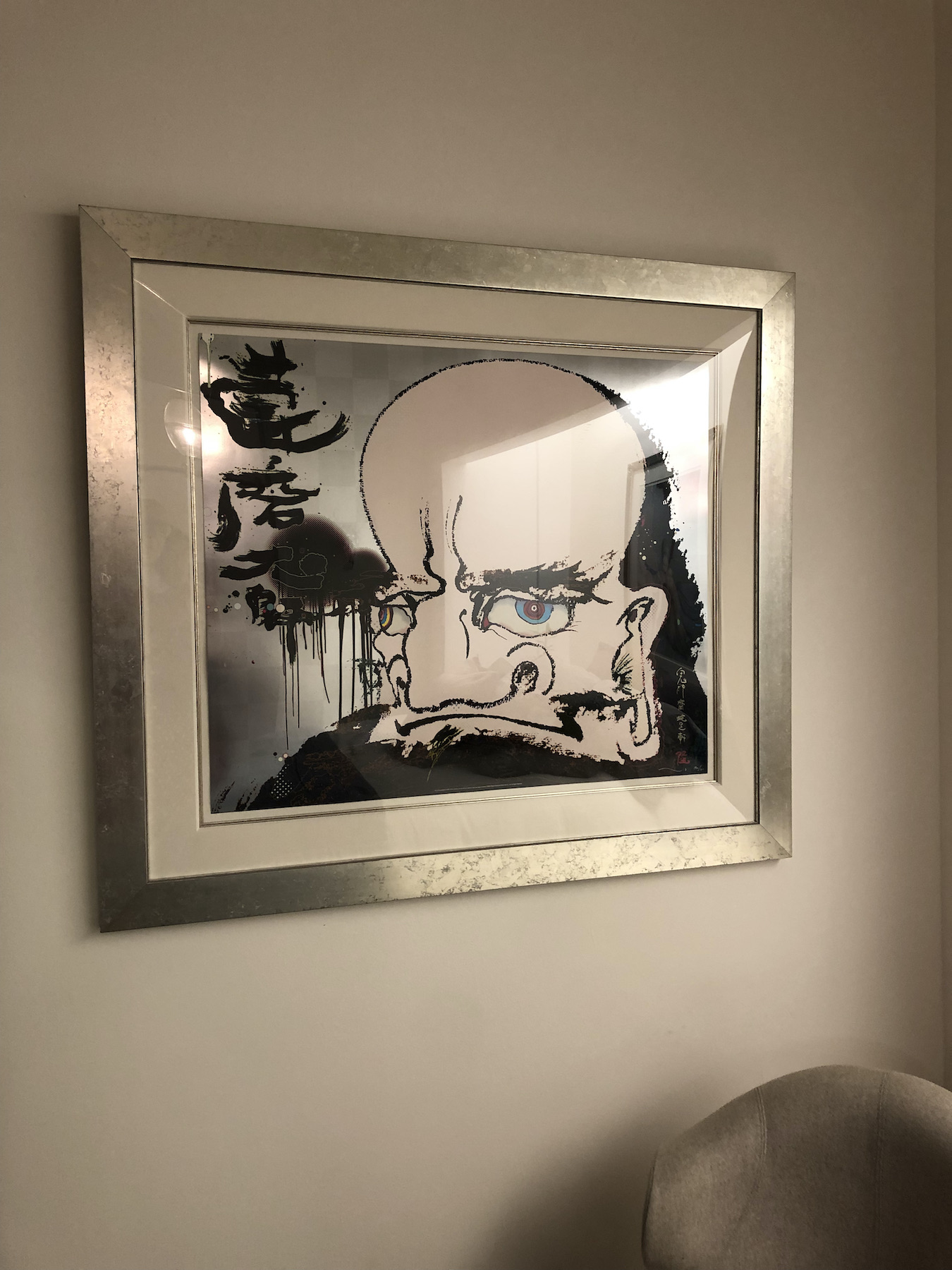
What is your biggest regret regarding collecting?
I’ve never actually had any regrets. I’ve never actually purchased anything I wished I hadn’t. I might have not purchased something that somebody else had bought at the time, so I might have missed the opportunity. That would probably be a regret, but the regret would be not purchasing something when I wanted to, or should have, versus I never have bought anything I regret buying.
How important is it for you to meet the artist who created the artwork?
I always love meeting the artists who create the artworks for two reasons. One, that I can express my appreciation for what they do. I think that’s really important, that artists are understood and appreciated for what they do. You can create it for yourself, but feedback is always good. Two, it also helps me understand more who they are and what drives them.
Do you rely on art advisors? How do you make your decisions concerning acquisitions?
Because I’m an artist myself and a designer, all my decisions are purely made by me. I know exactly what I want when I see it.
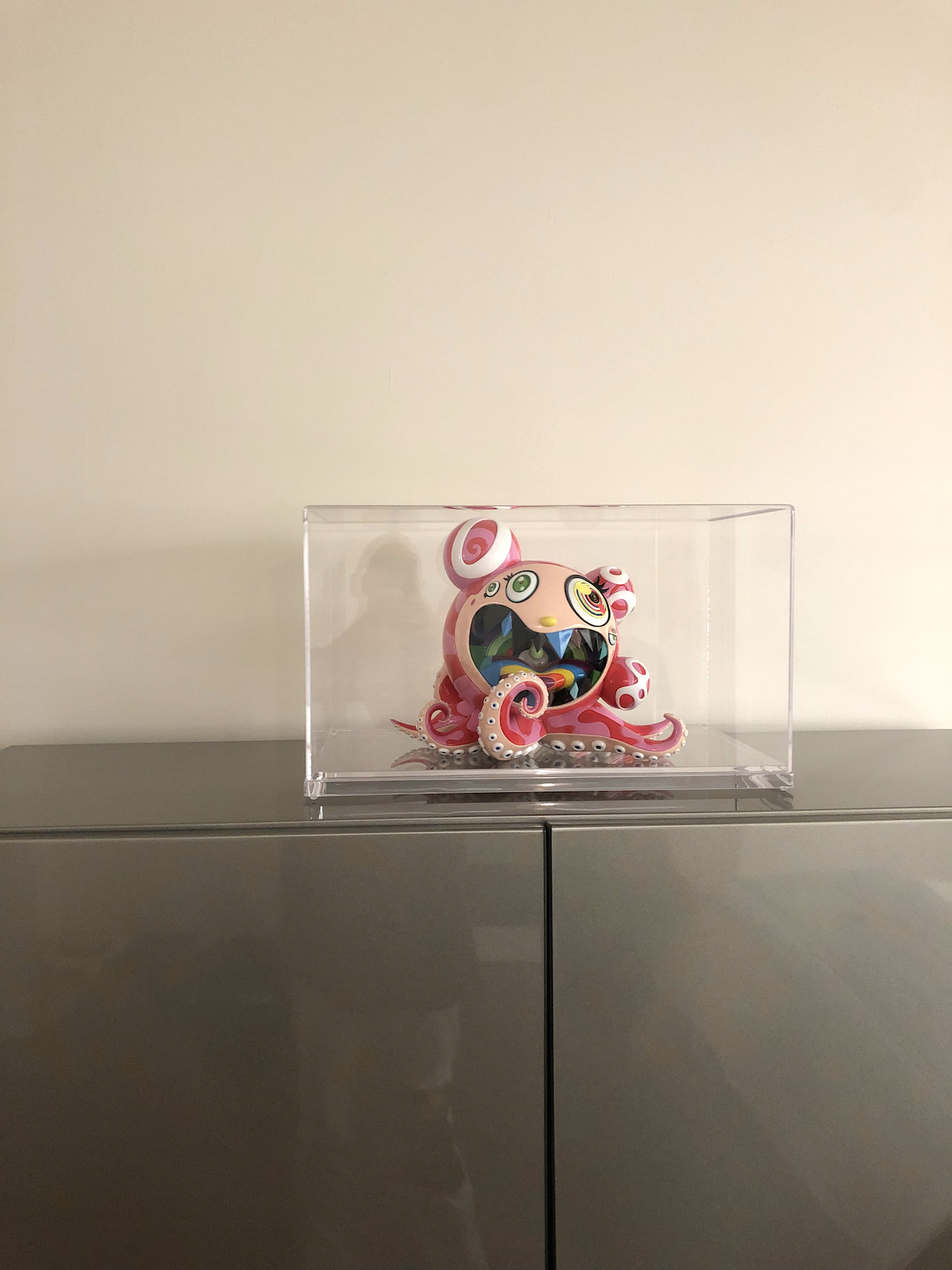
You are a lighting and production designer who has worked with the likes of Prince and Ariana Grande. Does your background influence your collecting?
Through my work and because of the business that I’m in as a designer, I travel all over the world. And so I’ve seen so many things. I go to museums. Just being influenced by culture and all the things that I’ve done—not only in my work but what my work enables me to do—definitely influences my collecting because it exposes me to so many different things.
Are there any differences between digital art collectors and “traditional” (or should we say “analogue”) art collectors?
The difference between a digital art collection versus an analogue collection is the digital art. Not all of it, but a lot of what’s coming up now is in a form that you can enjoy anywhere you go. As I said before, you can travel with it. You can display it in your home. You can display it in a hotel room. It’s always good to have both mediums, though. It’s good to have digital so that when you can’t travel with your art piece, the analogue piece, you at least still can enjoy it wherever you are in the world.
What makes a digital artist collectible?
For me, again, like any piece of art, it’s what moves me and what inspires me. I only collect what I like and not for any other reason than it moves and inspires me. So that’s what makes it collectible, for me.
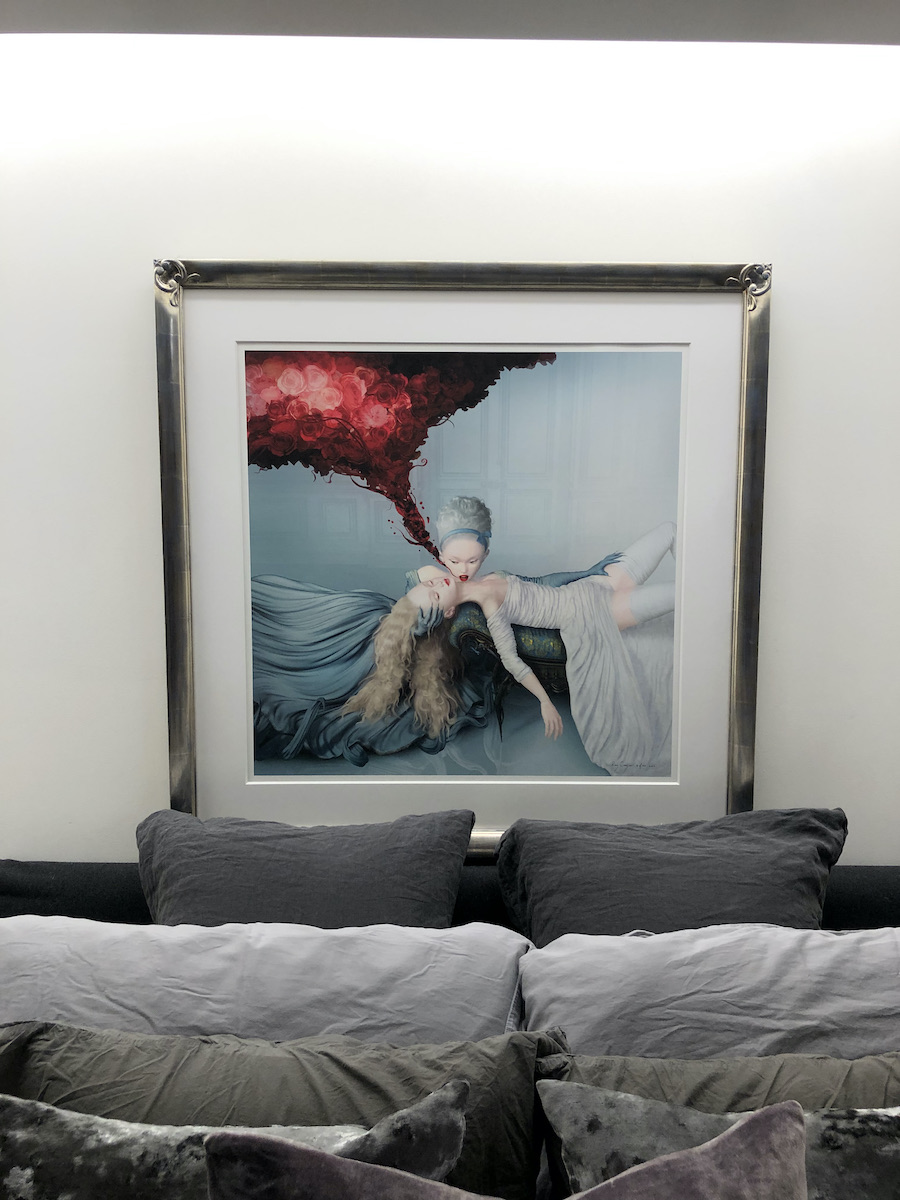
The Art World
What was your happiest moment being involved in art?
My whole world revolves around art to begin with because I am a designer, and I grew up in a home that was full of music and art and design. So for me, I don’t know any other way to live other than just being completely surrounded by things that are art-driven. It’s what inspires me, so I try to always be happy. I love art, and I think art is a very important thing for the world.
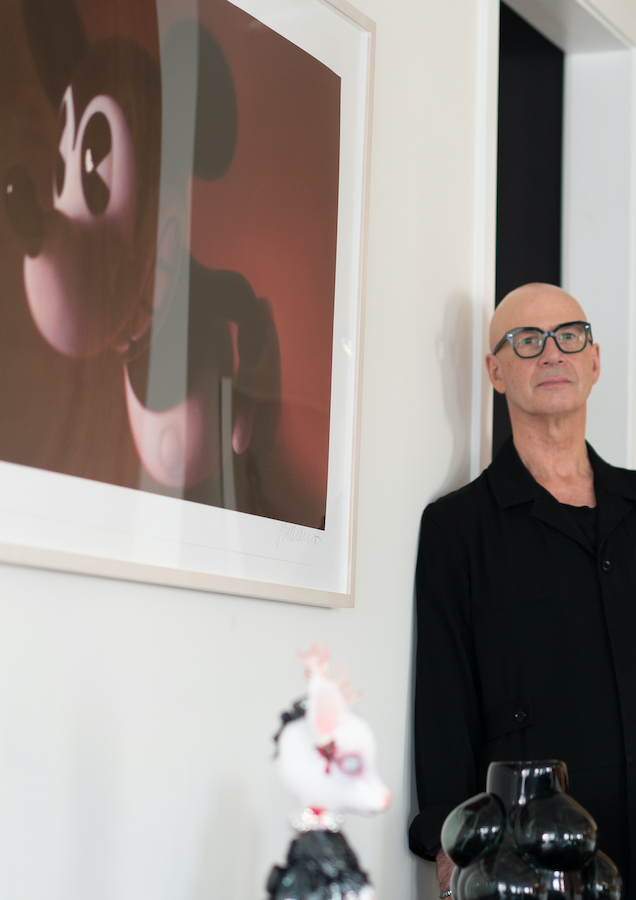
What is your art-world pet peeve?
My art world pet peeve would be some of the contemporary art installations. When I go to see some things that are hyped up and look at it and think, “Yes, I didn’t think of it, but there’s not much to it.” I like things that have got a lot more, that have a little story to them. I’m not talking about all art installations, just the pieces that I’m not moved by or find annoying or that have no soul to them. It just is kind of there because it can be there. I guess that would by my pet peeve. I like things that capture my interest for a long time.
Who inspires you in the art world?
It’s an ever-evolving thing. Many artists inspire me. In my younger days, Escher was one of the people that inspired me. Now, it’s all the digital art, like 0010×0010. It’s a new medium. It is not just visual; it is an audio thing. I find that really inspiring. For me, art should be even further than that. There should be a scent involved with the art, too. But that’s further down the line.
How are you discovering new artists these days?
Well, I’m always researching. I’m always researching the internet, either through different museums or galleries. It can be through Instagram. It’s everywhere. I mean, I’m constantly looking for things that inspire me.
What is your opinion on NFTs? Are they a passing fad or here to stay?
Because it’s such a brand-new thing, it’s an open playing field; it’s not one particular thing. NFTs can be anything right now, not just digital art. I think it’s going to be around for a while, but it’s hard to say. It could be a fad, or it could stay for a long time. Obviously, it has to do with digital currency and all of that stuff. It’s fascinating. There are some things that I’m designing for which I’m looking into making into an NFT. But I think part of an NFT is not just the digital piece, but also the analogue piece, too. I think people still always like to have analogue things.
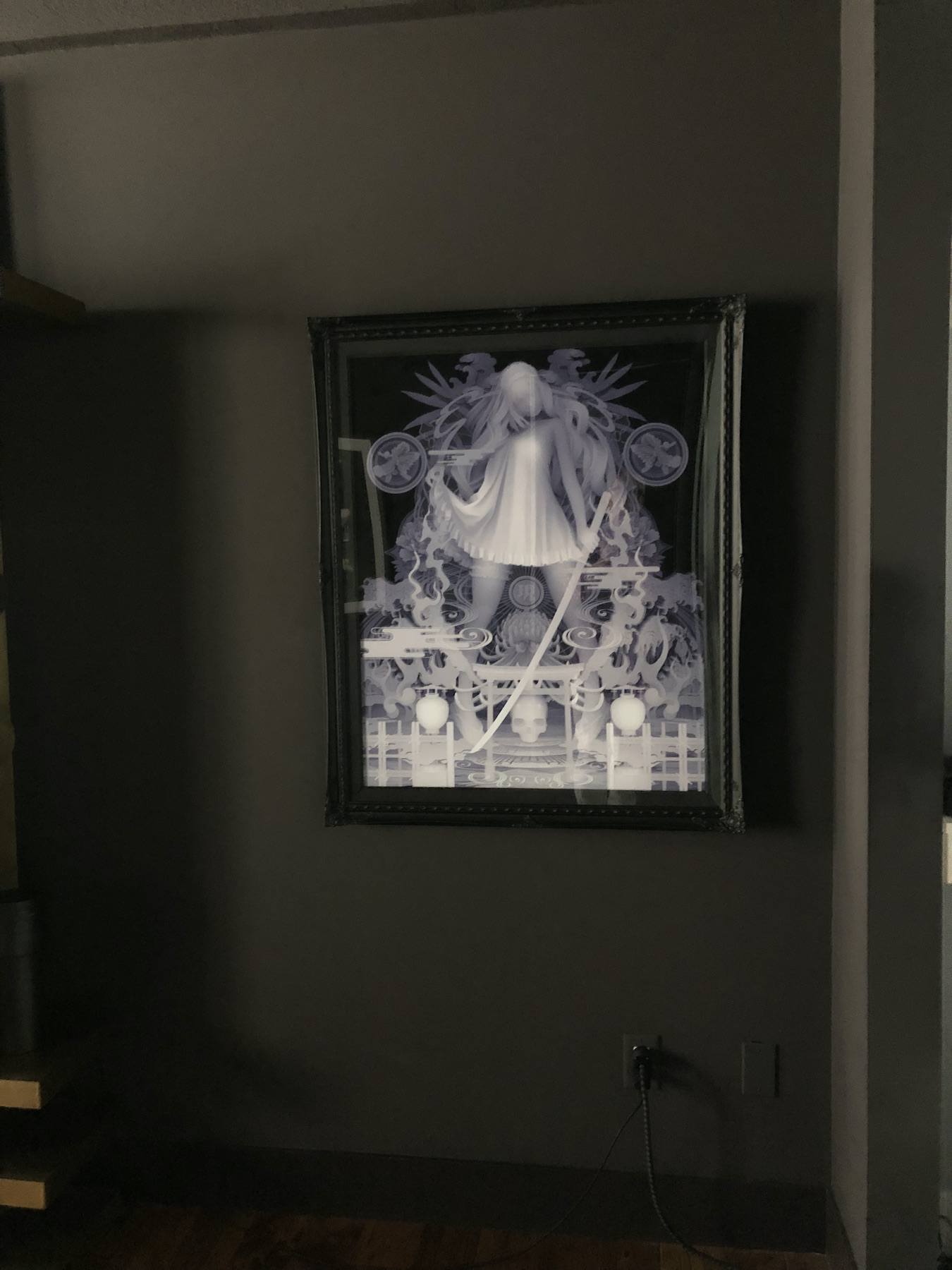
Other topics
What is your advice to young and fresh collectors and/or collectors looking to get into digital art?
There are two types of collectors: ones that collect based on their passion and then there are collectors that base it on the financial side. I buy art purely for what moves me and what I like a lot. I think that’s the best way for any young collector—to purchase things that they really love, that moves them, and that they’d want in their home, be happy to see on their walls or shelves or whatever, in whatever form it comes in. Just buy what you love.
Can you name three emerging artists that should be on our watchlist?
0010×0010 is one of the artists, absolutely, that should be on a watch list.
There’s an artist, I believe in London, who goes by the name of Reinfected.me (Marcin Pospiech), who produces digital art that’s a lot driven by coding. It’s a different kind of digital art versus 0010×0010. The coding part is fascinating to me because it is affected by sound in a way.
Another young, digital artist that I’m fascinated by goes by the name of She Draws with Code. Again, it’s visuals affected by audio.
Related: Leroy Bennett, Xumiiro Gallery
Instagram: @leleroybennett
A selection of artists Leroy collects:
0010×0010
Ray Caesar
Gottfried Helnwein
Takashi Murakami
Kazuki Takamatsu
By Jamie Bennett





